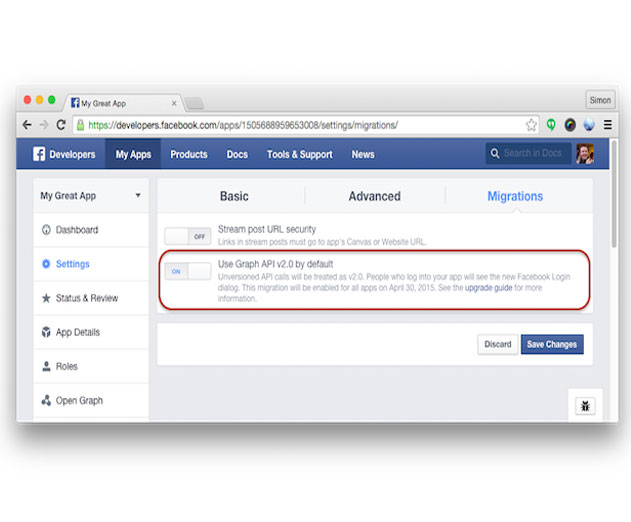Upgrade to Facebook Graph API v2.0 or Your App Will Break
Tuesday, March 17, 2015

|
Richard Harris |
Facebook’s Graph API v2.0 is the new Login and a Login Review process where Facebook looks at and approves any permissions that your app requests beyond public profile, e-mail and friend list.
The clock is ticking for all apps requesting these additional permissions to undergo review by April 30, 2015, when Facebook will deprecate Graph API v1.0. Not doing so could mean your app may break if you have not been approved for the permissions you're using or if you haven't upgraded your app to call Graph API v2.0 or greater.
Submitting Your App for Login Review
During Login Review the Facebook review team will actually use your app to see if the permissions you're requesting are used to improve the user experience, and are tied to a direct purpose within your app.
- Login Review is mandatory if your app asks for more than public_profile, email and user_friends permissions.
- For apps created after April 30th, 2014, Login Review is already being enforced. Apps created before April 30th, 2014 must complete review by April 30th, 2015.
- Decisions from Login Review take effect only after the April 30th, 2015 deadline, which means unapproved permissions will not be taken away until that date. After April 30th, 2015, only approved permissions will appear in the Login Dialog and accessible via API calls to the Graph API. Your app may break if it is expecting unapproved permissions.
- Login Review best practices include only asking for permissions you use: testing your app end to end; providing step by step instructions for the reviewer; checking your app against Facebook’s Platform Policies for compliance; and sending a screencast video.
Upgrading to Graph API v2.0 and the New Facebook Login
Graph API v2.0 contains a number changes from v1.0. Your app will automatically be upgraded after April 30th, 2015, but to prevent unexpected behaviors, Facebook suggests you update all of your app's API calls well before that date. To help you upgrade, Facebook has built tools to help understand see how your app behaves against v2.0:
- You can create v2.0-only Test Users and use these to login to your app to see how it will behave against Graph API v2.0.
- You can upgrade your entire app to v2.0 without code changes - just by flipping a switch in your app's dashboard. But you still have to submit your app for Login Review.
- For a subset of apps, Facebook is rolled out a feature that defaults admins, developers, and testers to Graph API v2.0. You should have received a Dev Alert if your app is part of this feature and instructions on how to opt out. This feature will not affect public users of your app - only people listed in the role sections of your app's dashboard.
Submitting for Login Review and upgrading to Graph API v2.0 or greater can happen independently. It doesn't matter which one you do first, or you can do both in parallel.
April 30 is just around the corner so don’t take chances on your app breaking by waiting too late to complete the process. Oh yes, and if you live in the USA, don’t forget to file your taxes by April 15 or your bank account might break as well!
Read more: https://developers.facebook.com/blog/

Become a subscriber of App Developer Magazine for just $5.99 a month and take advantage of all these perks.
MEMBERS GET ACCESS TO
- - Exclusive content from leaders in the industry
- - Q&A articles from industry leaders
- - Tips and tricks from the most successful developers weekly
- - Monthly issues, including all 90+ back-issues since 2012
- - Event discounts and early-bird signups
- - Gain insight from top achievers in the app store
- - Learn what tools to use, what SDK's to use, and more
Subscribe here











